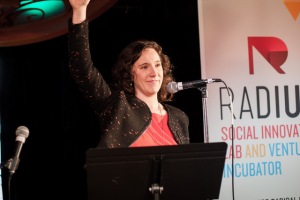Laughter and Catharsis Second Social Entrepreneur Failure Wake
After having seen the first Failure Wake in September, I knew that it would hard to improve on the event. The emotional punch of the stories combined with the energy of the room to give the entrepreneurs just the right level of support and cheer.
Last Monday night, RADIUS held its second Social Entrepreneur Failure Wake, and it was just as good as the first. Although each speaker had a very different style and type of business, they each embodied the spirit of the Wake, sharing openly and candidly about their mistakes and lessons learned. They either had us in stitches and almost in tears—and sometimes both—as theirs stories unfolded on the stage before the crowd of 180 people.
Donalda Weaver was the first to go. She shared the story of how she and her sister started East of Main Café on East Georgia Street in Chinatown. The Café was intended to support their nonprofit Project Limelight, a very worthy cause that works with disadvantaged children on performing arts. Donalda shared how the Café overcame a series of hurtles just to open. Once open they faced new challenges with staffing and nearby construction on the street made it nearly impossible to get to their restaurant.
Despite their best attempts and much more time and resources sunk into it, they ultimately decided to close the Café when they concluded it was no longer helping to fund Project Limelight. They are currently looking for the right partner to take over the location.
Brieanna Ingram spoke next. Brieanna grew up very close to her younger sister, who she recognized as exceptionally gifted. When she learned that her sister had ADHD (or Attention Deficit Hyperactive Disorder), Brieanna discovered her personal passion. She pursued a degree in special education and founded a tutoring company specializing in providing her customized curriculum to children with ADHD. Brieanna acknowledges that her strength in tutoring and working with children with ADHD was not matched by her strength with accounting. She was forced to close the business in April as her costs outweighed her income.
What I loved about Brieanna’s story was that she involved everyone in the room through simple and disarming activities. For example, she asked the audience to recount their day in 30 seconds in pairs, back to back. This was, in effect, a simulation of what it feels like to have ADHD. As she said, it should be called Attention Abundance Disorder because “everything is so interesting at the same time.” Ten to 12 percent of children are being diagnosed and nearly 30 percent of high school drop-outs have been diagnosed. Extrapolating that out, one can see the scale of the social problem if it is not addressed. While Brieanna’s business has failed, she has not. She has consulting work lined up and plans are under way for what the future holds for her to continue to work with children who have ADHD.
After the break, Preet Marhawa humbly took the microphone and recounted his story about why he started the food company Organic Lives. Preet’s story begins with his vision about how the world could be a better place through fairly traded, organic foods. Preet’s business gave quickly from a simple buy club for organic foods to a multimillion dollar business in just a few years. Yet, he admits when tragedy stuck, and his primary location burned in a fire, he could have been better prepared.
What struck me about Preet was his sincerity and vulnerability. He was not looking for excuses. He was not bitter that he had to live on borrowed money. Rather, he looked across the room and admitted that his own responsibility in the closing of his social business. In his particular lesson, I heard the general lesson for all of us: let us accept our responsibility for what can go wrong and yet, not be paralyzed by our fear. It’s a tricky, and yet, very important lesson for entrepreneurs and others alike.
Finally, Mike Tippett took the stage. He paused for a moment, looking like he might not know what to say and then he said that he did not know what to say. It was our first taste of his deadpan humor. Yet, Mike was not all jokes. Together with his founding team, he had dreamed of a mobile enabled service that would supercharge local economies through allowing anyone to request and find local products and service providers on their phones. They called it Ayoudo and in one 30-minute meeting with venture capitalists they were able to raise half a million dollars to fund their early exploration of the idea.
Mike and his team followed Lean Startup methods, researching their market, talking to customers, and eventually building out an early working prototype. At first, usage seemed positive, and then people just stopped using it. They would have to spend more time and money on research to understand their customers. They would need more VC money to fund this next stage of growth. And with each new round, they would have to argue that they would be worth even more money. Rather than dig a deeper hole, Mike and his team paused and reflected whether it would be worth it. To their credit, they knew when to call it a day.
Each speaker generously and graciously agreed to participate in the Social Entrepreneur Failure Wake. As he did in the first Failure Wake, Mike Rowlands, the MC, offered lyrical toasts to each of the speakers in his hilarious sometimes Irish, sometimes Scottish, and sometimes Newfie accent. It was a touching and fun way to put the past behind them and allow the speakers a way to move on to their next venture.



